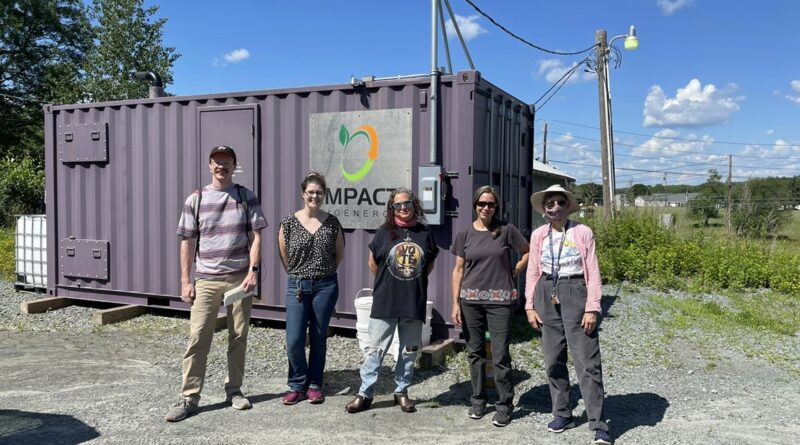Climate Corps Fellows Study Sustainable Food Waste Solutions at NYCHA
How much food waste would it take to power an electric bicycle?
Two graduate school students worked to find a solution to such an inquiry this summer while studying organic waste collection at NYCHA. Abigail Brown and Jed Higdon served as Environmental Defense Fund (EDF) Climate Corps fellows who helped advance the Authority’s environmental goals by examining innovative and sustainable solutions for processing food waste that could be implemented at NYCHA properties.
Throughout the two-and-a-half-month fellowship, Ms. Brown and Mr. Higdon analyzed the technical feasibility of processing food scraps with micro-anaerobic digestion (AD) at NYCHA sites. The process breaks down food scraps or other organic material into biogas, which can be converted into electricity, and liquid digestate, which can be applied as crop fertilizer.
The research work, which was conducted as part of a new food waste cohort this year for the EDF Climate Corps, was well-suited for the two NYCHA fellows, who are entering the second year of their respective master’s programs this fall. Ms. Brown, a New Jersey resident, is a Master of Public Policy student at Rutgers University who has researched organic waste management policies from around the country, while Brooklyn resident Mr. Higdon is a Master of Urban Planning student at NYU Wagner focusing on land use, transportation, and sustainability.
“I was really excited, because working at NYCHA can have a really big impact,” Ms. Brown said of the fellowship opportunity, noting the Authority’s significant resident population. “The EDF program is great because it’s such a motivated group of people that you get to make all of these connections with, both at NYCHA and through the EDF cohort.”
While Ms. Brown primarily worked remotely, Mr. Higdon said he was pleased to be able to conduct his analysis at a NYCHA office. Both fellows visited city composting sites and a location in Tusten, New York, where a micro-AD system is in place.
“We got to do some site visits in person, and for me, that was the most exciting part of the program,” Mr. Higdon said of the fellowship experience. “I think NYCHA is a really good place to work, and it’s really interesting thinking about all the publicly owned housing and land in the city and what’s going on with sustainable developments there, so I really enjoyed it.”
Juliette Spertus, an Urban Designer in NYCHA’s Sustainability Department who helped oversee the fellowship work, noted that the Climate Corps fellows’ research on food waste processing solutions like micro-AD supports NYCHA’s Sustainability Agenda.
“The NYCHA Sustainability Agenda includes the goal of providing access to organics collection to all residents by 2026, and we are now working to meet that goal,” she said. “We know that to meet this goal, we’re going to have to look at many different opportunities to collect organics.”
As a result of their fellowship research, Ms. Brown and Mr. Higdon concluded that implementing on-site micro-AD systems for organics is feasible at NYCHA. According to their final report, on-site micro-AD has the potential to reduce pests, odors, and costs of food waste removal.
In considering the potential uses for the energy generated through micro-AD, they proposed powering electrical bicycle batteries, presenting an example of how 36 pounds of food waste could be used to subsequently charge six e-bike batteries outside at a NYCHA development.
“We found that electric bikes are a bit of an easier charge with something like this because they require less energy,” Mr. Higdon explained.
While micro-AD has primarily been explored in rural areas and has funding challenges, Ms. Spertus is encouraged by the fellows’ findings that the sustainable process could be a feasible solution for organic waste at NYCHA.
“It has tremendous potential for skills building and as an educational tool, which I think fits very well with NYCHA programs around job creation,” she said. “We’re continuing to have conversations around micro-AD and its potential in New York City, and I think this will really help us as we think about how this could fit into NYCHA’s toolkit.”
After completing the fellowship at NYCHA, Ms. Brown said she became convinced that a career in government will be a good fit, adding that she hopes to eventually work on sustainability programs for the New Jersey state government. Mr. Higdon, who hopes to work in the transportation sector with a focus on sustainability, said he is pleased to learn that sustainability is top of mind at NYCHA.
Photo caption: As part of their Climate Corps fellowship research, graduate students Jed Higdon and Abigail Brown (second from left) visited a site in Tusten, New York where a micro-anaerobic digestion system is in place.







